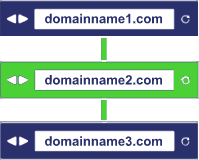If you don’t have the little green lock from a trusted SSL certificate, Google Chrome will tag your site as Not Secure.
With Leading Encryption, Identity & Website Security Solutions
Trust is everything. And, that's never been more true than in today's world, where there are now over 4 million data breaches per day. So, how do you ensure that your credibility, integrity, reputation and trustworthiness aren't at risk? Implement proper encryption, identity and security protections that users can see and feel. When consumers trust your security, they trust your brand. A trusted brand always wins—so, let's inspire trust together.
Select the plan that is more match to your needs
Select from our wide range of SSL certificates
Domain Validated (DV) certificates are a fast and simple way to secure your website with industry-standard up to 256-bit encryption. The process of obtaining one of these SSL certificates couldn’t be easier and is usually handled with just a standard email. A file-based authentication method can also be used and is recommended if you have direct access to the server that hosts your domain name. In order to receive a DV certificate from one of our trusted Certification Authorities (CAs), all you have to do is prove that you own the domain that you wish to protect. Since no extensive validation process is required, DV certificates are the most affordable type of SSL on the planet.
Organization Validated certificates, or OV certificates, are a type of SSL technology that offers up to 256-bit encryption to websites of businesses and other registered organizations. The difference between OV certificates and domain validated (DV) certificates is that a little extra vetting is required to confirm that you not only own your domain but that your organization is also legit. But don’t fret! So long as your business is registered, the validation process isn’t a problem. In most cases, it only takes a couple of days and you’ll be all set.
In the world of SSL/TLS, Extended Validation SSL certificates are the gold standard, or maybe we can call it the “green” standard. This complete SSL solution not only encrypts your website, safely protecting user information from prying eyes, but it also comes with a variety of extra premium features that have proven to boost trust & clearly demonstrate that you are, in fact, someone safe to do business with. The main way EV certs do this is by way of what we call the green address bar! Granted, the only thing green about the EV address bar nowadays is the font. But the name just kind of stuck. Not just anyone can obtain an EV SSL certificate, which activates this globally trusted & recognized green bar (especially no malicious or fake site). Before issuing your EV SSL certificate, your Certificate Authority (CA) has to first complete a thorough validation process to verify & ensure that you’re actually a legitimate business. So, if you’re a real business and you’re looking to maximize trust, boost conversion and align yourself with the big shots of the Internet – ya’ know, the companies that people already know and trust – then EV is the only way to go. After all, you’re trying to win, right?
If you have a website that has multiple sub domains, you’re going to love wildcard SSL certificates. Rather than having to purchase an SSL certificate for each and every sub domain, you can actually protect them all with just one wildcard SSL certificate. This can lead to some major savings and make managing your SSL portfolio a breeze.
Multi-Domain and Unified Communications Certificates (UCC) protect all sorts of different fully qualified domain names (FQDNs): public ID addresses, private host names, IP addresses and other subject alternative names (SANs) with one simple solution. Rather than buying an individual SSL certificate for each and every domain you control, this SSL is a cost-effective alternative that simplifies the validation process, saves you money, and offers the encryption you require.
There’s nothing a Multi-Domain Wildcard SSL certificate can’t secure. For any company or organization with a complicated public-facing web infrastructure, a Multi-Domain Wildcard is the perfect security solution. Depending on CA, you can secure up to 25, 100 or 250 different domains or IPs and all accompanying sub-domains. Nothing saves you more time, money and effort than securing your entire web presence with a single SSL certificate.
Code signing certificates are a useful tool that can be used to protect your code, content, and other files when transmitted online. Understandably, people are leery of downloading any applications that they can’t trust onto their computers, which is why code signing certificates are so valuable. By signing your file extension with this encryption technology, a third party Certification Authority (CA) will confirm you as the author of the file and the certificate will automatically alert the user if any changes are made to the code. That way you don’t have to worry that someone has altered your work without your knowledge.
Today more than ever, people rely on the Internet to send and receive personal information. Mortgages are signed. Bank accounts are opened. Applications for employment with social security numbers are submitted. The list goes on and on. And the only way that this is accepted is because of truly advanced encryption technology like you find in email and document signing certificates. With this tool at your disposal, you can send and receive sensitive information without worrying about the true identity of the sender or the data being compromised.
Heading #1 | Heading #2 | Heading #3 |
|---|---|---|
Simple content | Simple content | Simple content |
These encryption-only certificates are popular because of how fast and simple they are to get. All you have to do is prove you own the domain you wish to secure in order to get a DV certificate issued. This process usually takes just a few minutes to complete. You’ll get industry standard encryption and trust indicators like HTTPS and the padlock icon. Internal testing domains, blogs, and basic template sites are good candidates for DV certificates, since they offer full encryption but just basic trust indicators.


OV certificates are the “better” in the “good, better, best” model for SSL/TLS certificates. These certificates validate that a domain belongs to a registered business before being issued, and this process typically takes between 1-3 days to complete. The added benefit of an OV certificate is a dynamic site seal, which when clicked on, displays validated company information to a visitor, along with HTTPS and the padlock icon. These certs also offer 128- to 256-bit encryption and are perfect for registered businesses who can’t quite find room in their budgets for EV yet.
Extended Validation (EV) certificates are the most premium SSL solutions available. These are the only SSL certificates that can truly be viewed at as an investment, given their ROI potential. The main feature of EV certificates is the green address bar, the most universally trusted symbol across the web. Websites equipped with the green address bar – like Apple, PayPal, and Twitter – are instantly recognized as legitimate websites that can be trusted with personal information. The validation process typically takes a little more time with these certificates, around 1-5 business days, but if you have a registered business, we’ll help make sure you can get one!


These certificates do just as their name suggests – cover multiple domains with just a single solution. One Multi-Domain SSL certificate can cover up to 250 total domains, depending on the brand of certificate. Multi-Domain certificates are an extremely convenient option for businesses that own a lot of different TLD extensions and want to cover them all with up to 256-bit encryption without having to purchase and install separate SSLs for each one. Since these certificates are available in EV, OV, and DV options, you’re sure to find a Multi-Domain certificate that suits your needs.
Wildcard SSL certificates cover one domain name and an unlimited amount of sub-domains. For example, a Wildcard SSL certificate can cover www.domain.com, email.domain.com, login.domain.com, xyz.domain.com, etc. These certificates are extremely popular, affordable, and convenient solutions – since most domains have subdomains. Also, they are available in both DV and OV types, with no EV Wildcard SSL certificate currently available. Wildcard SSL certificates offer up to 256-bit encryption on all of the domains and subdomains that they cover.


There’s nothing a Multi-Domain Wildcard SSL certificate can’t secure. For any company or organization with a complicated public-facing web infrastructure, a Multi-Domain Wildcard is the perfect security solution. Depending on CA, you can secure up to 25, 100 or 250 different domains or IPs and all accompanying sub-domains. Nothing saves you more time, money and effort than securing your entire web presence with a single SSL certificate.
Code Signing certificates aren’t traditional SSL/TLS certificates, but they play an important and expanding role in online security and integrity. These are certificate-based digital signature algorithms that verify a piece of code hasn’t been tampered with since it was signed by the author. We like to think of it as a “digital shrink wrap” that validates code is being authentic and in its original form. It is the web’s tamper-proof system for software downloading. Code signing certificates are used and recognized by all major operating systems like Apple OS X, Linux, and Windows.


These increasingly popular certificates can validate the identity of both the email sender and the recipient. Email signing certificates are especially important within organizations, to ensure that the proper secure communication practices are being followed. We have email signing solutions available from Comodo, one of the most reputable online security companies in the world.
Here are the most frequently asked questions. You can also your questions by our Contact us forms
SSL, or Secure Socket Layer, is a universally accepted security protocol used by web browsers and web servers to protect data in motion—it’s the Web’s protocol for encryption. SSL has two components—the protocol and the certificate. The protocol is the code and procedures which allow computers to handle the encryption. The certificate identifies the specific web server and works in combination with a unique code used for encryption. Together, they enable a secure HTTPS connection.
Both SSL and TLS, or Transport Layer Security, are protocols that provide data encryption and authentication to ensure secure web communications. Although the terms are often used interchangeably, SSL is the predecessor to TLS, and there are slight differences in the protocol. Certificates are not dependent on protocols. The protocols are determined by the server configuration, not the certificates.
HTTP has been the accepted standard since 1997 and was the traditional way to serve up a website, even though it didn’t provide a secure connection. When you install an SSL certificate, your website will be served up using HTTPS (HTTP + SSL) instead of HTTP, indicating an encrypted connection.
An SSL Certificate is a server-based software product that serves two primary functions. The first is to secure data in motion by enabling an encrypted connection between clients (website visitors) and web servers (that host a website) via the SSL/TLS protocol. All SSL Certificates offer this base-level encryption but differ on the second function—identify validation. The second important function of an SSL Certificate is to authenticate, or validate, the identity of the company or organization holding the certificate. Trust is everything when you’re communicating or doing business online. Today’s skeptical visitors need assurance you’re legitimate. SSL certificates offer various levels of validation and visual trust indicators. That’s why choosing the right SSL Certificate with sufficient identity validation is critical to your online success.
The importance of securing data is obvious when you consider the sensitivity of information sent across the Internet. That’s why all browsers have now require all webpages—not just e-commerce—to be served over an encrypted, or HTTPS, connection. Webpages still being served via HTTP now display a “Not Secure” warning to visitors so across-the-board encryption is critical. But SSL Certificates provide more than just encryption—they validate identity and communicate trust, the foundation of the online economy, using visual trust indicators. Premium SSL Certificates offer more in-depth validation and display globally recognized trust symbols that have been proven to increase conversion among other benefits.
All SSL Certificates allow the visitor to click and see the validated owner of the domain. Organizational Validation (OV) SSL Certificates also display the verified company name. Extended Validation (EV SSL Certificates are the only ones that also display the verified company location and activate the globally recognized Green Address Bar.
All SSL Certificates offer basic encryption. But trust is everything when you’re communicating or doing business online. And that’s where the differences between SSL certificates are significant. Thw more premium an SSL Certificate, the more comprehensive the validation requirements, the more extensive the visible certificate details and the more visual trust symbols displayed—the more trust it conveys. Your visitors need to be confident about engaging with you and your SSL Certificate is what they use to decide if you’re trustworthy. It’s important to choose your SSL Certificate wisely. Learn more about the differences between Domain Validation (DV), Organizational Validation (OV) and Extended Validation (EV) SSL Certificates.
Most domains have sub-domains. A Wildcard Certificate is a convenient, cost-effective ways to get industry-leading encryption for one domain and unlimited sub-domains with one certificate. For example, a Wildcard can cover www.domain.com, email.domain.com, login.domain.com, xyz.domain.com, etc. You’ll save money, boost search engine rankings and future-proof your site. Wildcards ensure you give visitors a secure experience across your entire website while making it easy to manage certificates and renewals. There are no extra steps or difficulties when installing a Wildcard SSL Certificate. Wildcards are available for both DV and OV SSL Certificates, but not EV because of the extensive validation process. Find out more about how to protect multiple domains and sub-domains.
Multi-domain SSL Certificates, or SAN Certificates, are the simplest way to secure multiple domains with just a single certificate. You simply fill out a SAN, or Subject Alternative Name, for every additional domain you wish to cover. This saves you money compared to buying a single-domain certificate for every domain. It also allows the certificate to be generated for all your domains at once and makes managing your certificates a whole lot easier. Another nice feature is you can add additional domains throughout the lifecycle of this certificate by simply re-issuing it. Get more details about how to protect multiple domains.
Code Signing Certificates are used by software developers to digitally sign apps, drivers and software programs. They reassure end users that the code they receive hasn’t been altered or compromised by a third party. These certificates include your signature, company name and a timestamp.